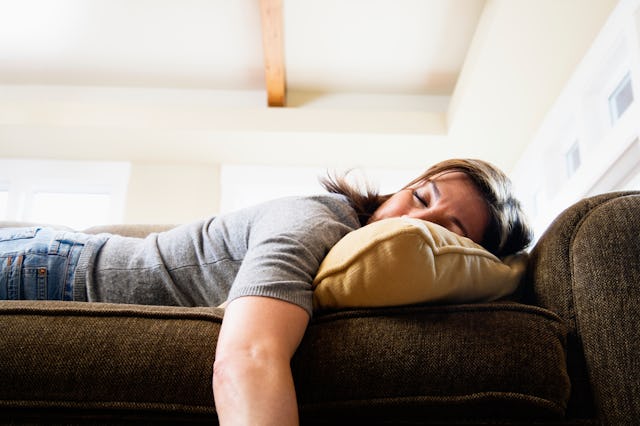The Periods You Get During Perimenopause Are A Whole Different Ball Game
I felt like I had just fought off the horrible flu while getting my period.

I’ve always had rough periods, but when I was in my mid-forties, my monthly cycle took a turn for the worse. I specifically remember one Saturday afternoon when I had to bail on all my plans and spend the afternoon on the sofa. I knew I was due for my period, but I also thought I was coming down with something. I had the chills, I felt a bit nauseated, and it felt like I had a fever, even though the thermometer said my temp was normal.
After about 24 hours, my flu-like symptoms were gone and I was left with cramps, the worst breast tenderness I’ve ever had, and a feeling like I was underwater. I figured I had just fought off the horrible flu while getting my period. Mine have always been bad, but this was different.
When all the same symptoms returned the following month, I wondered if it was my imagination. How could my periods get this much worse because I was getting older? It wasn’t just physical symptoms either: My mood swings were worse (something I didn’t think was possible), and I was up a lot during the night while I was premenstrual, and my kids noticed I was getting (even more) forgetful at times.
That was about four years ago, and I now know that periods during perimenopause are a whole different experience. Every month, I must remind myself that these incredibly annoying symptoms will pass, and I just have to do my best to get through it. It never fails, though: sleepless nights, lots of sweating and tears, my anxiety worsens, and I struggle to stay focused and remember things.
Mid-life is when many women start going through perimenopause and are left feeling completely run down before and during their periods. Unfortunately, this can last anywhere from two to ten years, according to Hopkins Medicine. That’s a whole lot of joint and muscle aches, trouble sleeping, night sweats, mood swings, headaches, and trouble concentrating. Yikes.
In other words, feeling like I was fighting off the plague wasn’t my imagination, and I’m not alone, either. All the symptoms hitting you simultaneously every month is enough to make you want to stay in your room behind a closed door until it passes. My family certainly would appreciate it if I did that.
Looking for an explanation about why I was so miserable, I talked with Sophia Yen, MD, MPH, the co-founder and CEO of Pandia Health. “Breast tenderness and forgetfulness is a result of the changes in hormones. Estrogen plays a very important role in our functioning as people accustomed to estrogen,” she told me. “So during perimenopause/menopause when estrogen drops, you experience lots of symptoms that can be uncomfortable, including higher cholesterol, poor bone density, and vaginal dryness.”
If you are struggling and need some relief, Yen suggests trying to stay active, eat healthily, and get enough sleep. Not exactly a magic bullet, but it should help. But if you have really, really bad symptoms Yen recommends talking to your gynecologist or primary care doctor, or seeking out a NAMS (North American Menopause Society) certified provider.
Since we can’t outrun or hide from these symptoms — believe me, I’ve tried — it’s such a relief to know there are things we can do to ease them. And cut yourself some slack, too. If you need to cancel your plans and spend the day on the sofa with a carton of ice cream, the rest of the world can deal.
Katie Bingham-Smith is a full-time freelance writer living in Maine with her three teens and two ducks. When she’s not writing she’s probably spending too much money online and drinking Coke Zero.